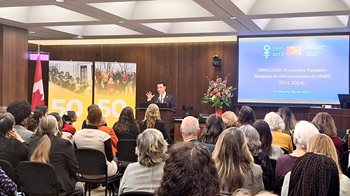Last month, I attended the National Association of Women and the Law (NAWL)’s 50th Anniversary Reception and Awards on Parliament Hill in Ottawa, marking five decades of feminist law reform advocacy in Canada.
Among the esteemed guests were Algonquin Elder Annie Smith-St-Georges, who led the opening prayers, the Honourable Arif Virani, Minister of Justice and Attorney General of Canada, and the Honourable Justice Freda M. Steel of the Court of Appeal of Manitoba, who delivered the keynote address. Also in attendance were numerous other dignitaries and champions of women's rights.
Recalling her acceptance of Prime Minister Harper’s apology on behalf of Canadians for the Indian Residential School System, Annie Smith-St-Georges shared her own experiences of trauma and PTSD and emphasized the need for reconciliation and action, stating, “Everybody says think out of the box, but now it’s a call to action. Let’s jump out of the box.” In particular, she stressed the need to prevent the criminalization of Indigenous youth suffering from trauma, who, due to fear, are reluctant to seek medical help or shelter, often to their own detriment. She advocated for healing and support systems for these youth rather than resorting to punishment. She also called for collective action to address the systemic issues facing Indigenous women and communities.










